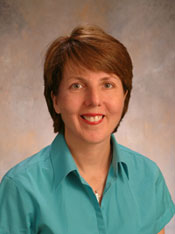By Rashika Rangaraj
 Dr. Eileen Dolan, Professor of Medicine at the University of Chicago, is dedicated to transforming patient care and health through her research by combining laboratory discoveries with patient needs. Her motto has always been to improve the patient’s quality of life, which she has successfully pursued using different approaches that range from pharmacological modifications of a single protein to identifying gene variants, with the ultimate goal of making chemotherapy more efficient and less toxic. In addition to training several scientists and inspiring many more, many of whom are independent scientists, she has also initiated two programs that introduce cancer research to enthusiastic high schoolers to help them gain a better understanding of current developments in research and inspire them to pursue a career in research.
Dr. Eileen Dolan, Professor of Medicine at the University of Chicago, is dedicated to transforming patient care and health through her research by combining laboratory discoveries with patient needs. Her motto has always been to improve the patient’s quality of life, which she has successfully pursued using different approaches that range from pharmacological modifications of a single protein to identifying gene variants, with the ultimate goal of making chemotherapy more efficient and less toxic. In addition to training several scientists and inspiring many more, many of whom are independent scientists, she has also initiated two programs that introduce cancer research to enthusiastic high schoolers to help them gain a better understanding of current developments in research and inspire them to pursue a career in research.
Dr. Dolan, by training, is a chemist, having completed her bachelors at the University of Dayton and her doctoral degree in Medicinal Chemistry from Purdue University. With her strong background in analytical chemistry, she transitioned into drug development and obtained her training in biochemical pharmacology in Dr. Anthony Peggs’ lab at Pennsylvania State University. During her postdoctoral study she focused on developing compounds to inhibit a specific DNA repair protein that would later passage into clinical trials against cancer. Following this she obtained her first position at the University of Chicago as a translational oncologist. Through her newly founded lab in the department of Medicine, she applied her strong chemistry and pharmacology background to address clinically relevant questions to meet the needs of cancer patients.
Then came one of the biggest turning points of her career, where she made a dramatic switch to venture into what was then an exciting, emerging field, now continues to be one with lots of promise- Pharmacogenomics. This field combines the powers of genomics and pharmacology to identify genetic variations that affect drug response and drug toxicity. She strongly believes this would eventually lead to evaluating patients for genetic variants upon which their course of therapy could be decided such that effective outcomes with lowered toxicity could be achieved, also popularly termed as “personalized medicine”. It promises to greatly improve lives of several patients suffering from toxic side-effects of chemotherapy like hearing loss and neuropathy. She has pioneered in developing novel cell-based models to study why different patients respond differently to the same chemotherapy regiment. She notes that the answer lies in their genetic make-up. She placed emphasis on taking an unbiased approach to research by “stepping back and allowing the data to dictate”. She notes that the field of genomics has been revolutionized by unbiased analysis of genomic data, where intronic (non-coding) regions in the DNA could also play a vital role in complex diseases such as cancer.
Improving patient lives is not the only gratifying part of her work; she also enjoys being an educator and mentor. Besides mentoring many graduate students, medical students and post-docs, she has initiated two notable projects to inspire young minds to pursue science. The first is the Continuing Umbrella of Research Experience (CURE) program which is designed for the most promising high school and undergraduate students from underrepresented populations interested in pursuing careers in cancer research. This allows students to immerse themselves in hands-on research and complete small achievable projects under established mentors at the University of Chicago. The second program is called researcHStart, an 8-week cancer-focused research and career development experience for the most promising high school students from the Chicago and Champaign-Urbana areas.
Drawing from her own experiences, her one advice was, “ taking risks is a big part of succeeding in life”. She stressed that as a woman one needs to cultivate a courageous, willing to take risks type of personality at the same time remember that things will not always work out as planned and be open to failure.
Dr. Dolan is an avid runner, loves to perform yoga and enjoys cooking for her family. Additionally, she spends time over the weekends with elderly citizens. She notes that their unique perspective on life is enchanting.
